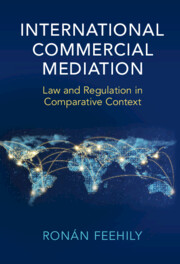Book contents
- International Commercial Mediation
- International Commercial Mediation
- Copyright page
- Dedication
- Contents
- Preface
- Foreword
- Cases
- Statutes
- International Conventions, Laws, Codes and Rules
- 1 Introduction to Commercial Mediation
- 2 Commercial Mediation in the International Context
- 3 Agreements for Future Mediation
- 4 Approaches to Mediation
- 5 Mediators and Their Appointment
- 6 Lawyers and Other Professional Mediation Supporters
- 7 Conduct and Costs
- 8 Mediated Settlement Agreements
- 9 Confidentiality
- 10 Process Controversies
- Bibliography
- Index
7 - Conduct and Costs
Published online by Cambridge University Press: 01 September 2022
- International Commercial Mediation
- International Commercial Mediation
- Copyright page
- Dedication
- Contents
- Preface
- Foreword
- Cases
- Statutes
- International Conventions, Laws, Codes and Rules
- 1 Introduction to Commercial Mediation
- 2 Commercial Mediation in the International Context
- 3 Agreements for Future Mediation
- 4 Approaches to Mediation
- 5 Mediators and Their Appointment
- 6 Lawyers and Other Professional Mediation Supporters
- 7 Conduct and Costs
- 8 Mediated Settlement Agreements
- 9 Confidentiality
- 10 Process Controversies
- Bibliography
- Index
Summary
Where there is a significant risk of onerous costs being imposed on recalcitrant parties, a substantial increase in the number of disputes being mediated is the likely outcome. There is a clear link between the deployment of costs sanctions for unreasonable refusal to mediate and the increased use of mediation by commercial parties. Many jurisdictions, notably England and Wales among them, have equipped courts with the powers and authority to use mediation as a device for containing costs. Attempting to assess a party’s conduct to determine whether a costs sanction is appropriate has significant implications for mediation confidentiality. Objective criteria developed in seminal cases offer guidance to the courts in determining whether a party’s refusal to mediate was reasonable, and guidance to advisors and parties when considering mediation. While there are potential human rights implications where sanctions are construed as a means of making mediation compulsory, costs sanctions have proved to be an effective form of targeted incentive-setting where regulatory aims are integrated into the parties’ decision-making process.
- Type
- Chapter
- Information
- International Commercial MediationLaw and Regulation in Comparative Context, pp. 162 - 198Publisher: Cambridge University PressPrint publication year: 2022

